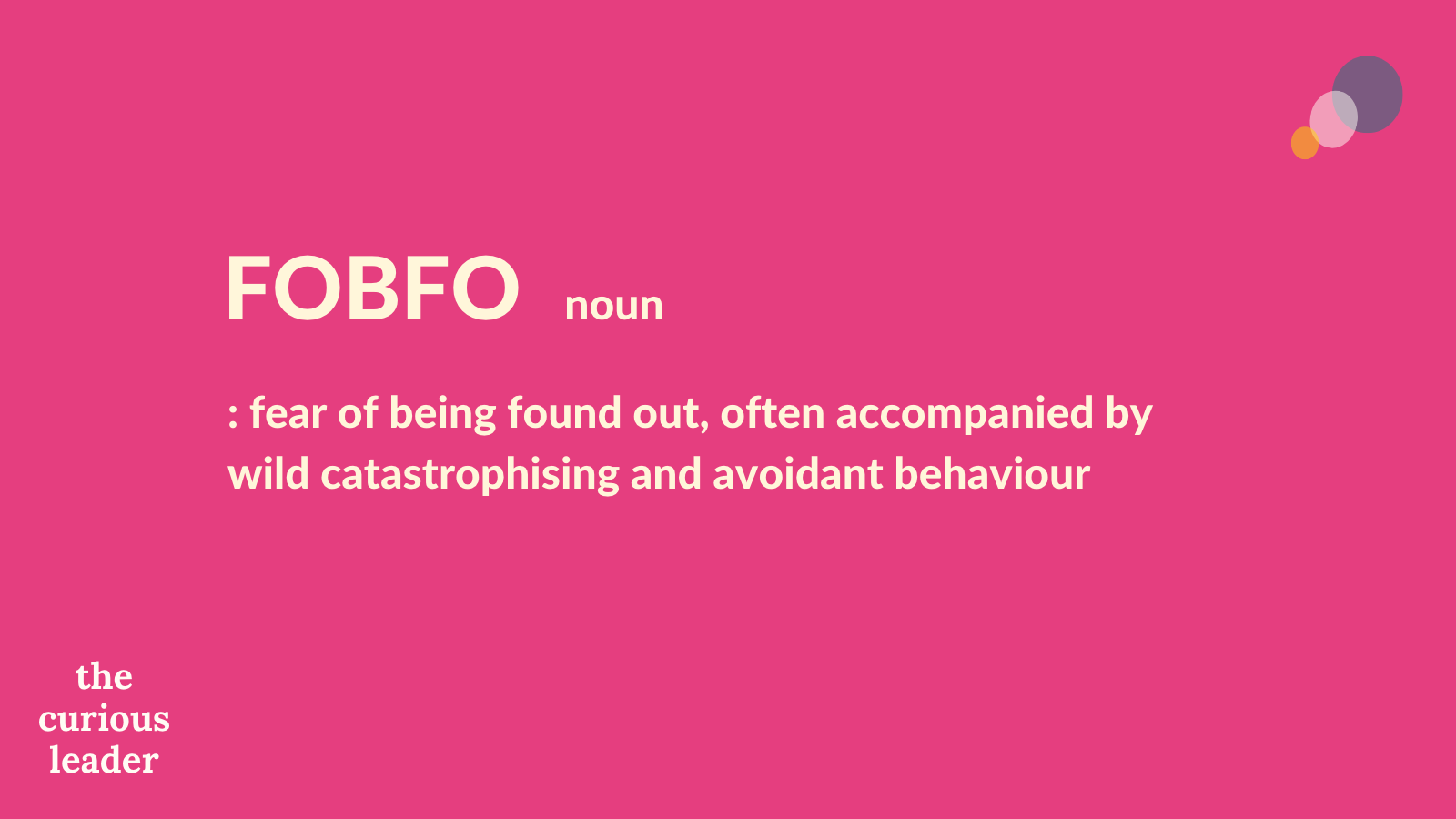Today’s cheery topic is… FEAR. 🙀😬😭 For clarity, not the fear of danger.[1] I'm curious about a different sort of fear, that of being found out. Or FOBFO for short. Do we all have it? Pretty much. Would we prefer not to disturb the dragon? Yep. But does FOBFO show you where to get curious? Hell, yes!
Name your FOBFO
Let’s focus on work. Which projects, conversations or opportunities give you inner ‘ugh’? Or launch missions of avoidance? Or hurl you down anxious alleys? What is tinged with… shame?
That thing. Look it in the face. Get curious: can you name your fear? Can you clarify how you will be found out, and by whom? It doesn’t sound like much, but identifying your FOBFO can really help. A) because you get clarity on what’s bothering you. And b) because sometimes it’s so nuts even you’ll dismiss it.
Ask impertinent questions
Let’s assume your FOBFO hasn’t yet vanished. You can erode quite a few fears with some impertinent questions. So get curious again.
What do you think will happen? And then what? And then what?
Why do you think x shaming/humiliating/exposing outcome will arise?
What assumptions are you making? Are they true? Do you actually know?
How do you know? Is your evidence actually reliable?
Are your expectations insanely high? 🙄
Thing is, perhaps your assumptions are sound. You really might make a mistake or trip over your own foot.[2] But most mistakes can be fixed. And comedy pratfalls can lighten the tone. So always ask: does it matter? Because unless what you’re doing is actually life or death, the answer is probably: not a lot.
FWIW, I reckon it’s much easier to ask impertinent questions with someone else. Stuff said out loud tends to be stickier. Plus they won’t let you answer AND THEN I MIGHT DIE!!! each time.
Hm, do you have an example?
Yep, here’s a nice one I heard from a friend the other day. Although it’s applied to everyone I know at some point. And it shows how even very smart people can dig the mother of all ditches between FOBFO and reality.
My mate Nick is a writer. An expert writer, in fact. He’s written fiction, journalism, speeches and even non-fiction on reading all the writing out there. His products, courses and thought leadership are much sought after. And his own writing is a whipsmart, rip-roaring read. In fact Nick’s success is slightly puke-inducing. But he’s very nice so I (mostly) forgive him.
Anyway. The other day Nick told me he just doesn't know his grammar. 🤯 He also told me that this used to worry him. His thought process back then? He was the expert in the room. He ought to know everything. Not knowing one thing invalidated all his expertise. Cue FOG OF ANXIETY!
What if someone asked a question he couldn’t answer? What if they wanted to know when to use the indicative vs. subjunctive? What if they wanted his take on the casual use of gerunds?[3]
Well, he concluded, if any of that happened, his clients would fall about laughing. His career would be crushed.
AND THEN HE MIGHT DIE.
But wait! Smart man that he is, Nick got curious:
What if he didn’t know the answer?
Fine! More fun to find out together.Did his expertise hang on formal rather than instinctive prowess?
Nope. After all, he doesn’t need to be a mechanic to be a good driver. It’s just the same with writing. And in writing terms, he’s a really great driver.Was not knowing everything actually useful for his audience?
Yes! It made him more relatable. Which made his audience more engaged and up for learning. Phew!
By owning his grammatical FOBFO, Nick transformed it into a strength.[4]
And hey, in some ways he was lucky. He already had loads of real evidence to check his assumptions. But what if you don’t? What if it's all unknown? Well, FOBFO feeds on flights of glum fancy. So bash it with reality. Fire up test—learn—adapt!
1. TEST 🧪
Face your FOBFO
Find out what happens when you’re in your shame-inducing nightmare by choice. Like what? Well, if your FOBFO centres on demonstrating value, you might prioritise asking incisive questions over telling what you know in big meetings.[5]
Or if it's public speaking, you might run some ‘lunch and learns’ for adjacent teams.
But FOBFO is personal. So get curious about which experiments could address yours. Start small so you're less inclined to run away. And avoid one-offs or you’ll risk rogue results.
2. LEARN 🤔
Notice your results
FOBFO can make oblivion quite appealing. Give it an eye-roll. Instead: notice with intent.
Notice what happens, and how you respond to what happens
Notice what helps you manage your FOBFO
Notice what gets in the way
Notice whether, having faced your FOBFO, you’re now further forward. Even if it tasted like a cup of cold sick.
3. ADAPT 🔄
Adjust your approach
Hurrah, you’ve faced your FOBFO! You’ve got some actual evidence! So choose what to do with it. Don’t skip this bit. (Sounds obvious, but experience suggests otherwise.)
How could you adjust what you thought, said or did for an even better outcome?
What will you do again?
What will you not do?
When will you test again, and again?
Sometimes a few adaptations can dispel a FOBFO altogether. But a smarter goal is to manage your FOBFO so it’s not holding you back. And less FOBFO = more brainspace.
Put your FOBFO through the ringer!
Or… don’t. Because there’s something quite comforting about FOBFO. Being found out is scary. And who wants that? Much better to carry on coasting instead. Except that that way lies boredom and dissatisfaction. Plus a sneaking suspicion in those around you that perhaps… you’re not up to it after all.[6]
Which really is terrifying. So imagine that friendly eye-roll and face your FOBFO. Want some help with this? Say, with some practical examples of experiments you could run? In a format that's more live, less very long newsletter? It’s in the works!
Keen to get curious and fancy a spot of help?
Get intensely curious about who you are, who you’re not, and what actually matters with Impertinent Questions. My nosiness meets your context each weekday for a month.
Get curious with The Curious Leader newsletter direct to your inbox. Longform, practical, personal opining on curiosity in leadership. Like today’s on FOBFO-busting, or this one on owning your success.

